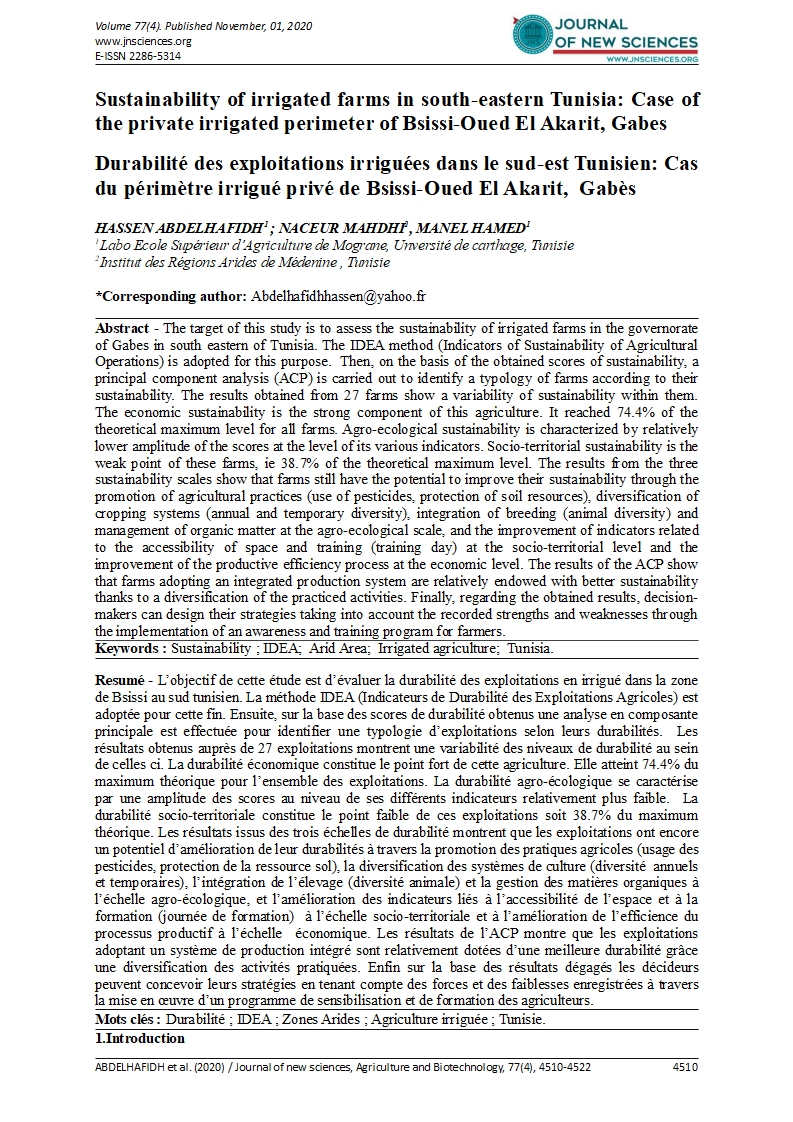

Sustainability of irrigated farms in south-eastern Tunisia: Case of the private irrigated perimeter of Bsissi-Oued El Akarit, Gabes
Durabilité des exploitations irriguées dans le sud-est Tunisien: Cas du périmètre irrigué privé de Bsissi-Oued El Akarit, Gabès
HASSEN ABDELHAFIDH1
NACEUR MAHDHI2
MANEL HAMED1
1Labo Ecole Supérieur d’Agriculture de Mograne, Unversité de carthage, Tunisie
2Institut des Régions Arides de Médenine , Tunisie
Abstract - The target of this study is to assess the sustainability of irrigated farms in the governorate of Gabes in south eastern of Tunisia. The IDEA method (Indicators of Sustainability of Agricultural Operations) is adopted for this purpose. Then, on the basis of the obtained scores of sustainability, a principal component analysis (ACP) is carried out to identify a typology of farms according to their sustainability. The results obtained from 27 farms show a variability of sustainability within them. The economic sustainability is the strong component of this agriculture. It reached 74.4% of the theoretical maximum level for all farms. Agro-ecological sustainability is characterized by relatively lower amplitude of the scores at the level of its various indicators. Socio-territorial sustainability is the weak point of these farms, ie 38.7% of the theoretical maximum level. The results from the three sustainability scales show that farms still have the potential to improve their sustainability through the promotion of agricultural practices (use of pesticides, protection of soil resources), diversification of cropping systems (annual and temporary diversity), integration of breeding (animal diversity) and management of organic matter at the agro-ecological scale, and the improvement of indicators related to the accessibility of space and training (training day) at the socio-territorial level and the improvement of the productive efficiency process at the economic level. The results of the ACP show that farms adopting an integrated production system are relatively endowed with better sustainability thanks to a diversification of the practiced activities. Finally, regarding the obtained results, decision-makers can design their strategies taking into account the recorded strengths and weaknesses through the implementation of an awareness and training program for farmers.
Keywords : Sustainability ; IDEA; Arid Area; Irrigated agriculture; Tunisia.
Resumé - L’objectif de cette étude est d’évaluer la durabilité des exploitations en irrigué dans la zone de Bsissi au sud tunisien. La méthode IDEA (Indicateurs de Durabilité des Exploitations Agricoles) est adoptée pour cette fin. Ensuite, sur la base des scores de durabilité obtenus une analyse en composante principale est effectuée pour identifier une typologie d’exploitations selon leurs durabilités. Les résultats obtenus auprès de 27 exploitations montrent une variabilité des niveaux de durabilité au sein de celles ci. La durabilité économique constitue le point fort de cette agriculture. Elle atteint 74.4% du maximum théorique pour l’ensemble des exploitations. La durabilité agro-écologique se caractérise par une amplitude des scores au niveau de ses différents indicateurs relativement plus faible. La durabilité socio-territoriale constitue le point faible de ces exploitations soit 38.7% du maximum théorique. Les résultats issus des trois échelles de durabilité montrent que les exploitations ont encore un potentiel d’amélioration de leur durabilités à travers la promotion des pratiques agricoles (usage des pesticides, protection de la ressource sol), la diversification des systèmes de culture (diversité annuels et temporaires), l’intégration de l’élevage (diversité animale) et la gestion des matières organiques à l’échelle agro-écologique, et l’amélioration des indicateurs liés à l’accessibilité de l’espace et à la formation (journée de formation) à l’échelle socio-territoriale et à l’amélioration de l’efficience du processus productif à l’échelle économique. Les résultats de l’ACP montre que les exploitations adoptant un système de production intégré sont relativement dotées d’une meilleure durabilité grâce une diversification des activités pratiquées. Enfin sur la base des résultats dégagés les décideurs peuvent concevoir leurs stratégies en tenant compte des forces et des faiblesses enregistrées à travers la mise en œuvre d’un programme de sensibilisation et de formation des agriculteurs.
Mots clés : Durabilité ; IDEA ; Zones Arides ; Agriculture irriguée ; Tunisie.
